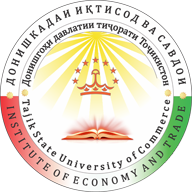
Today, the IET TSUC is one of the fast-growing universities in Khujand, North of Tajikistan. Being relatively young (founded 2010) and being a medium-sized HEI makes us flexible and operational to changes and reforms. During the last 5 years, the IET TSUC has accelerated its internationalisation processes and until now the internationalisation strategy development is one of the core elements for the university’s overall development. Nowadays the international relations of the IET TSUC bring a lot to the university. The statistics show, that more than 25 projects run during the last five years at the IET TSUC are all developed, implemented by the international relations office, also the external funding attraction, international seminars and training, international mobilities are executed due to the efforts of the international relations office of the IET TSUC.
The main objective of the IET TSUC is the implementation of recommendations and instructions of the Founder of Peace and National Unity – the Leader of the Nation, the President of the country, His Excellency Emomali Rahmon for the preparation of competitive specialists in the global labor market. With this aim, the Institute trains future specialists on the basis of comprehensive training of:
- professional economic and juridical knowledge;
- high-level business communication in the labor market;
- modern innovative technologies;
- knowledge of at least 3-4 foreign languages;
- train GLOBAL citizens;
- Entrepreneurial competences.
The vision of the IET TSUC is to be recognized among leading regional universities, which train competitive specialists for the global labor market. The IET TSUC positions itself as a regional player in the higher education sector of Central Asia, intending to strengthen its role and impact on the development of the region.
The mission of the IET TSUC is to enrich students with relevant knowledge and professional skills, make them capable to solve complex socio-economic development issues and train successful and competitive professionals at the national and international levels.
As mission, vision and objectives state about the training of specialists capable to work at the international level, it emphasizes the relevance and importance of internationalisation strategy. The objectives of the Strategic Plan for Internationalisation (SPI) of the IET TSUC derive from the main strategic document and develop a vision for expanding and enhancing the scope of the international initiatives. This SPI serves as a tool for achieving those set strategic goals and aims. The IET TSUC defines its SPI as a strategy directed to effectively achieve IET TSUC’s goals, facilitate adaptation to globalization processes, and imbue international competencies to its beneficiaries. Considering the main mission of the IET TSUC – training competitive specialists in a global labor market, our graduates must have a broad worldview, intercultural skills, and advanced foreign languages skills. All these competencies and skills are possible to gain in a highly internationalized university. The SPI of the IET TSUC will be based on building strong networks with EU universities for further implementation of joint international projects in teaching and research, knowledge transfer and international mobility, and running joint degree programs in the near future. However, internationalisation is not just about mobility, many leading universities under internationalisation mean a broad understanding, vertical integration of internationalisation at all university levels and units.
Target countries for cooperation in the framework of international mobility projects and projects of capacity-building are:
Spain
Finland
China
USA
Italy
Poland
Czech Republic
Latvia
Lithuania
Estonia
Croatia
Hungary
Romania
Bulgaria
Portugal
Cyprus
Turkey
Being an innovation oriented institute, IET TSUC implements programs of scientific and academic cooperation with 76 higher educational institutions, organizations and research institutes from more than 25 countries around the world.
An important direction of the institute’s activity is the academic mobility of students. By 2023, more than 86 students, master and doctoral students received training and internships abroad under the academic mobility program.


